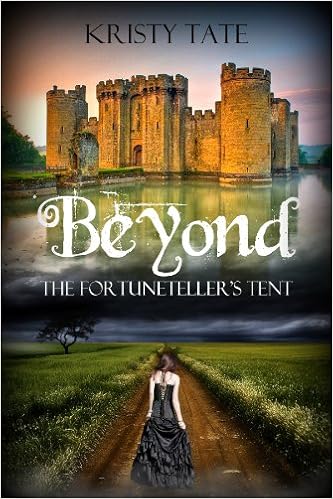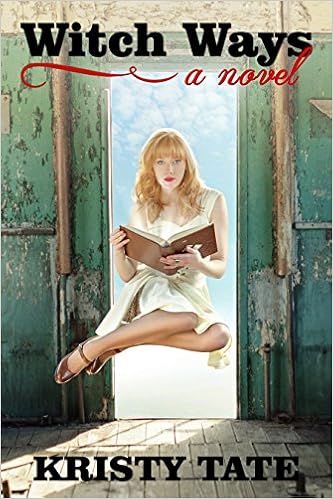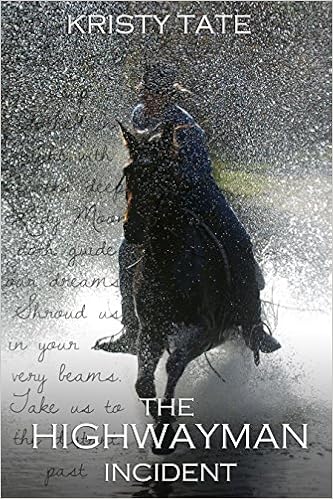It is my pleasure to present Kristy Tate, an imaginative and prolific author of time-travel and paranormal novels. Bereaved of her mother at a young age, she channeled her grief and anxiety through her love of books. Years later, she's an award-winning, Amazon bestselling author.
MJN: This question may sound odd, but how did the time travel
romance develop in the first place? Why do authors opt for a sci-fi element
instead of setting the novel in a particular historical period? Does it add
humor to have a contemporary character hurled into a foreign world?
KT: A time
traveler is the ultimate fish out of water story. I can't speak for other
authors, but some of my very favorite movies are time travel romances, When
Peggy Sue Got Married, and Kate and Leopold to name a couple. I got the idea
for the Witching Well series while I was watching a documentary on the Salem
Witch Trials, long before the release of the Outlander TV series. And of
course, I had read and enjoyed Outlander twenty some years ago, and thought I
should write a time travel romance! Never suspecting that the release of the
Outlander TV series was right around the corner. This has actually happened to
me a few times. I was days away from publishing Beyond the Hollow, set in
Washington Irving’s Catskills when I learned of the Sleepy Hollow TV series. I
was in a movie theater and when the trailer came on I actually screamed. My
husband was completely humiliated, but I, of course, was enraged.
MJN: I am intrigued by the cover on Highwayman Incident. The
trend for historical novels is to show a heroine with a part of her head cut
off. You opt for a different technique, actually leaving the figure of the
horseman but shrouding it in ashes.
KT: My
daughter designs my book covers, and I think we’ve grown together. I like to
think my novels are getting better and better, and I know her covers are
getting better. Frankly, I don’t want to look like a typical romance, because I
think that would send a wrong message. I don’t write the ‘typical’ romance, and
I think if people are expecting a Julia Quinn (who I love, by the way—although
I skip over her sex scenes) they’ll be disappointed, and maybe even write a
nasty review.
MJN: Your Beyond series is intended for younger
readers. You reference figures like the Headless Horsemand and Grigory
Rasputin. How much background knowledge of history and literature does an
average reader need to possess in order to have a firm point of reference? Do
you hope that reading your works will prompt your younger audiences to read or
revisit the originals?
KT: I
actually lived close to Washington Irving’s Sunnyside, and I loved his work. I
hope Beyond the Hollow reflects that. I got the idea for Beyond the Pale while
watching another documentary. This one was on the unusual religious practices
of Rasputin. I suspect he’s been demonized, but I would love to meet him. He
must have been a terribly charismatic man. And of course, I would love to think
that anything I wrote would make people dig into history. Actually, one of my
favorite reviews is a 3 star of Beyond the Fortuneteller's Tent where she said
after reading it she had to get out a Bible and do some research. But for the
most part, my books want to be nothing more than entertainment.
MJN: Your recent title is Witch Ways. It's set in
Connecticut where I live! This state is often used as a setting for novels and
films that explore the issues of social status and gender roles. Films like Stepford
Wives come to mind.
KT: While
my husband worked in New York City, we lived in Darien, Ct, and I have really
sweet memories of our time there. I didn’t know it when we first moved there,
but many of my ancestors lived in Fairfield County as early as the 1600s
(Darien is in Fairfield County.) I made lifelong friends there, and I think I
will always have a tender place in my heart for Connecticut—despite the witch
trials. I'm sure southern Connecticut is often characterized for it's WASPish
ways, but it has a rich history.
MJN: It's always a delicate balance between being true to
yourself and not alienating your readers. I have a pretty thick skin and an
open mind and a sense of humor, so it's next to impossible to offend me.
Readers seem to be polarized on the issue of witchcraft and paganism in young
adult fiction. There are some extreme cases of religiously conservative parents
prohibiting their children from reading Harry Potter. On the opposite end of
the spectrum, I've come across a few manuscripts that offered little more than
humorless, vindictive Christian-white-male bashing. Honestly, that kind of
writing generates more yawns and eyerolls than strong reactions. How do you
avoid falling into that trap?
KT: Interesting
you would ask! I knew that I’d offend some Christian readers, but I also
suspected that those who had issues with witchcraft wouldn’t be reading my
books! What I didn’t know was I’d offend those who follow witchcraft. (I got a
nasty review from someone who clearly hadn’t read the book who thought I was
trying to “convert others to her religion” and that I thought “all witches
should burn.”) The truth is this phrase struck me—“everyday we all have to
decide whether or not to be a witch,” and I wrote about a teenage girl who
didn’t know who she is. Probably more than any of my other characters, I “get”
Evie. While writing this series, I really plumbed my teenage self. I lived
alone with my dad. I watched his courtship with my stepmother…with horror. I
had one boyfriend after another. It was really a difficult time. I’ve since
learned that books became my drug of choice—my way of escaping my grim
realities—during my mother’s long illness, her death, and my father’s rocky
remarriage. I hope my books can offer others a safe and entertaining escape
when life gets too real and hard. I know the intent of my heart (and I believe God
does, too.) If others choose to be offended, that’s their issue, not mine, and,
frankly, none of my concern.



Great interview! All good books, too.
ReplyDeleteWaving hello to Kristy, and pleased to meet you, Marina.
ReplyDeleteWow, that was one of the most engaging author interviews I think I've read on a blog.
I love this comment, Kristy, "books became my drug of choice—my way of escaping my grim realities" That teen, pre-teen, and adult escape into books is extremely common and for a variety of reasons, but it is still an escape. So many young people as they make the break between childhood and adulthood explore who they are and how they fit in the world around them. It's nice for them to have books where the heroine is going through some of the same inner quandaries. Keep writing, Kristy!